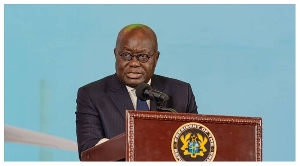Regional News of Saturday, 23 February 2019
Source: ghananewsagency.org
NGO holds workshop on E-Waste management in Tamale
Caritas Ghana, a development NGO of the Ghana Catholic Bishops Conference, on Tuesday began a two-day workshop on electronic waste (E-Waste) management for the Tamale Ecclesiastical Province on its E-Waste Management Project "Care For Our Common Home".
The project seeks to provide possible ways of addressing the electronic and plastic waste in the country by controlling their growing trend and potential damage to the environment, human health and livelihoods.
The workshop was aimed at exploring and coming out with an agreed framework on how to expand the electronic waste management initiative to the collection centres of the Tamale Ecclesiastical Province covering the five (5) dioceses of the Province: Tamale, Navrongo-Bolgatanga, Wa, Yendi and Damango.
The E-Waste project will also train young people on the collection and dismantling of electronic waste as well as begin the establishment of a dismantling factory that can recycle the electronic waste in the north.
The project is supported by the Deutsche Gesellshaft fur Internationale Zusammenarbeit (GIZ) and also in partnership with City Waste Recycling Ltd.
The Reverend Father Carolus Magnus Gambogi, Cathedral Administrator in Tamale, who read a speech on behalf of the Metropolitan Archbishop of Tamale, commended (GIZ) for their cooperation with Caritas Ghana in addressing some of the critical environmental and social problems in the country such as the E-Waste, youth unemployment and irregular migration.
He assured GIZ of the keen interest of the five (5) dioceses of the province to see to it that the project initiative was firmly planted.
The Reverend Father Gambogi said the E-Waste initiative was also a good prospect for the creation of jobs among the youth, a means to help reduce youth unemployment rate in the country.
He, however, urged that the partnership between Caritas Ghana and GIZ should provide investment capital for a business plan, not for the sake of profit and interest but for sustainability.
Mr Markus Spitzbart, the Head of Programme of the E-Waste Programme at GIZ, said GIZ was going to support government to introduce a sustainable e-waste management system in the country.
He indicated that GIZ was working to help government also design a sustainable e-waste recycling chain, set up a recycling fund as well as setting up legislative frameworks for e-waste management.
He said GIZ also sought to introduce a business sector, one that the informal and other institutions and organisations could benefit from and improve their businesses along the E-Waste chain.
He urged the citizenry especially the youth to venture into the E-Waste chain since it provides a lot of different opportunities but advised them to handle E-Waste in a responsible way since it had a lot of health hazards.
Mr Samuel Zan Akologo, the Executive Secretary of Caritas Ghana, said the workshop will to go a long way to set up a dismantling project in the north to help prevent youth unemployment from migration.
"We don't want the young people in the north traveling to Accra and facing all the difficulties that they are faced with in the Agbogbloshie scrap market" he said.
He said in a recent survey, about 90 per cent of the young people in the Agbogbloshie scrap market were northerners in search for greener pastures and improved livelihoods.
Mr Akologo said Caritas Ghana would also device modalities through the campaigns in addressing the hazards and threats that electronic waste pose to the health of people and the environment.
“It’s very dangerous to burn electronic waste since it pollutes the air with dangerous chemicals resulting in diseases such as cancer and other things," he said.
He said the E-Waste project would be set up with a business perspective by incorporating business models into the initiative for sustainability.













